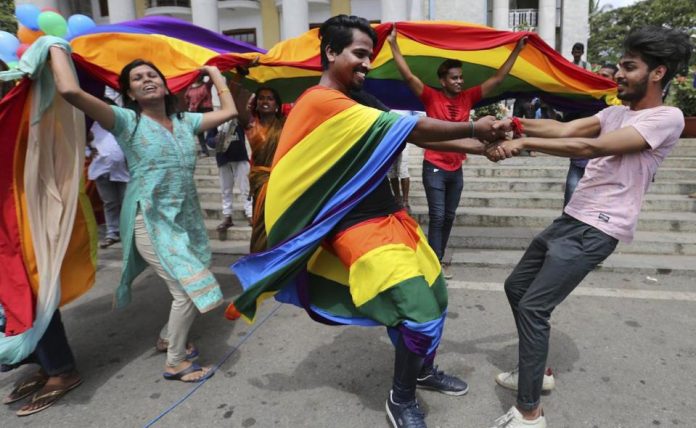
India’s high court this week came down on the side of civil rights ending a colonial-era ban on gay sex—one of the world’s oldest such laws and one that included the possibility of life in prison. The ruling also extended anti-discriminatory protections to LGBT people.
“This ruling is hugely significant,” Meenakshi Ganguly, the South Asia director for Human Rights Watch, told the New York Times, which went on to paraphrase Ganguly: “It could set a precedent for nations with similar colonial-era laws to end their ‘discriminatory, regressive treatment’ of gay and transgender citizens.”
The NYT report, shared this morning by The Boston Globe, went on to report:
After weeks of deliberation in the Supreme Court — and decades of struggles by gay Indians — India’s chief justice, Dipak Misra, said that the colonial-era law known as Section 377 was “irrational, indefensible and manifestly arbitrary.”
“We have to bid adieu to prejudices and empower all citizens,” he told a packed courtroom.
The court said that gay people are now entitled to all constitutional protections under Indian law and that any discrimination based on sexuality would be illegal.
All around this country, explosions of happiness erupted — and some of outrage, as well.
Gay people hugged, danced, kissed, and closed their eyes and cried on the steps of the high court in Bangalore. In Mumbai, human rights activists unleashed a blizzard of confetti.
In their judgments, the justices said that homosexuality was “natural” and that the Indian Constitution was not a “collection of mere dead letters” and should evolve with time.
The justices seemed well aware of the place they were taking in history. Nation after nation has been extending full rights to gay people under the law, and now India, as the world’s second-most-populous country, stands, at least legally, among the more progressive. …
The court said that Section 377, written in the 1860s to cover what were then considered unnatural sexual acts, would still be used in cases of bestiality, for instance, but that it could not be applied anymore to consensual gay sex.
The justices seemed moved by the stories they had heard in court from the gay plaintiffs about harassment, blackmail, abuse, and persecution.
“History owes an apology to members of the community for the delay in ensuring their rights,” Justice Indu Malhotra said.
Menaka Guruswamy, one of the lead lawyers representing the gay petitioners, called Thursday’s decision a “huge win” with important implications. In the courtroom, Guruswamy said, the mood was “optimistic, buoyant, very excited.” As the judges read out their decision, the crowd tried to remain composed. Outside, a cheer went up, and people hugged tightly.
“This decision is basically saying, ‘You are not alone,’ ” said Ganguly. “The court stands with you. The constitution stands with you. And therefore your country stands with you.’”








